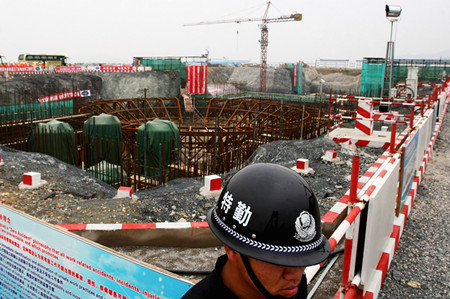Energy
Nuke approvals may resume
By Du Juan (China Daily)
Updated: 2011-06-25 09:12
 |
Large Medium Small |
|
 |
|
The construction site of the Sanmen Nuclear Power Plant in Zhejiang Province. China suspended the approval process for new nuclear power projects following the March 11 earthquake and tsunami in Japan. [Photo/For China Daily] |
Expert says a restart in 12 months could be possible, but is 'optimistic'
BEIJING - China could resume the approval process for new nuclear power projects by mid-2012, a senior nuclear expert said on Thursday. The comments came almost three months after the country suspended the procedure following the March 11 earthquake and tsunami in Japan.
"To restart the approval procedure in one year is the optimistic estimate, but the country will definitely lift the suspension in two years," said Zheng Yuhui, director of the research center of the China Nuclear Energy Association.
| ||||
He said that an August resumption would not allow enough time to rebuild the public's confidence in nuclear power.
Zheng said that there is no doubt that China will continue to develop its nuclear power industry more efficiently in coming years and that the government's policy for the development of nuclear power has not altered.
"However, we need to control the pace of development and ensure the safety of projects. That's a priority for the industry," he said.
The crisis at Japan's Fukushima Daiichi nuclear power plant might delay some new projects in China, but it will not stop the country from achieving its target of building 70 to 80 gigawatts (gW) of installed production capacity by the end of 2020, said Shen Wenquan, a member of the expert committee of the State Nuclear Power Technology Corp Ltd.
"The growing demand for power in developing countries requires China to choose nuclear power," he said. "The government is working on producing a safety plan for the industry and it will take some time to raise the safety standards and make the necessary adjustments," said Shen.
He added that the country will accelerate research into third-generation nuclear power technology and will also monitor the development of fourth-generation technology.
According to Shen, a reactor demonstration project for China's CAP 1400 technology, which is based on the advanced AP 1000 pressurized water reactor, will be located in Shidao Bay in Shandong province and will be completed by the end of 2020.
China's first inland nuclear power project, the Taohuajiang Nuclear Power Plant, is still under construction
Shen said the country should speed up construction of inland nuclear power plants.
The newest nuclear power facilities in the world will be located in China in the future, meaning that the country will definitely lead the global nuclear power industry because of the high domestic demand for power. Nuclear projects require huge amounts of investment, and so the ability of fourth-generation technology to efficiently reduce costs will be a crucial factor in its adoption, said Zhan Yu, vice-president of No 3 investment department of China Aerospace Investment Holdings Ltd.
All the nuclear projects approved before the suspension are currently under construction, and so the country will almost definitely achieve its goal of increasing the use of non-fossil fuels to 11.4 percent of annual power generation by the end of 2015, said Zheng.
| 分享按钮 |



